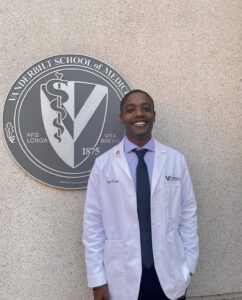Year 2
If the M1 year is all about adapting to the med school environment, your M2 year takes you straight to the heart of medical innovation. On the MD side, you’re immersed full-time in clerkships, spending 6-8 weeks on the essential medical rotations. On the MIDP side, you’re applying an engineering mindset to evaluate and improve your clinic experiences.
The MD Foundation: Clerkships
Vanderbilt’s unique one-year preclinical curriculum gets you into clinic one afternoon a week during your M1 year, but M2 is a whole new ballgame. Together with the rest of your med school class, you’ll be immersed full-time in the six core clerkships: surgery, medicine, pediatrics, OB/GYN, neurology, and psychiatry.
Meanwhile, in MIDP: Innovation Activism
In this year-long course, you’ll take a closer look at clinical problems you’ve encountered in each clerkship. Guided by engineering and clinical faculty, your MIDP cohort will work as a team to:
- Identify 8 to 12 health care systems-level problems, a few from each of the core clerkships
- Use an engineering mindset to categorize each problem by significance and feasibility
- Identify and interview key stakeholders engaged in each issue
- Translate the qualitative problem you saw during clerkship into a quantitative model that can be addressed with a design-thinking mindset.
- Meet once every 6 to 8 weeks to present these issues and discuss your analysis
At the conclusion of your M2 year, you’ll have created several clinical problem statements for future development in the M3 and M4 years.
Meet a second-year MIDP student

M2 Darryl Delsoin started his own nonprofit to provide clean cooking fuel to people in his home country of Haiti before coming to Vanderbilt University School of Medicine. He sees MIDP as a natural fit to combine h
is passion for entrepreneurship with medical knowledge and care.
“When I found out about MIDP and the chance to combine entrepreneurship with my passion for medicine, I thought it was really neat,” he said. “Coming to the U.S., I didn’t know exactly how clinics work here. I’ve had some shadowing experience, but that doesn’t mean I know how everything works; the systems are complicated.
“MIDP offers a learning experience where I can identify the problems and be innovative in that multifaceted and complex system. I’m not exactly sure what I want to do after medical school, but I know I want to do things that address problems at a systemic level. I know I want to work at a clinic, but I also want to work on initiatives that can be incorporated in many clinics across many cultures.”